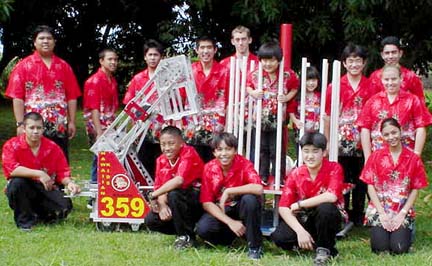


|
Isle high school Professional basketball scouts might want to check out the robots that McKinley and Waialua high school students have built that can shoot with amazing accuracy.
robotics teams
build on success
Community support helps
McKinley and Waialua students
go to a national contestBy Pat Gee
pgee@starbulletin.comBut the technical expertise was not the only thing that won both teams a trip to the nationals of the 10th annual FIRST Robotics National Competition for the first time. As with any winning team, clever strategy and teamwork were the building blocks to glory.
Neither team was planning to go to the nationals, even though both qualified in regional competition, because neither could afford it, as has been the case in years past.
But community benefactors in Waialua would hear none of it when the Waialua team came in first as part of an alliance in the regionals in San Jose, Calif., and brought home a "judge's favorite" award. Led by Castle & Cooke, which donated $15,000, various companies chipped in thousands more so the team could go, according to Ted Nagata, Waialua teacher and coordinator.
McKinley's trip was made possible when the NASA Ames Research Center, the main sponsor behind the contest, waived the $4,000 registration fee, and the Harry and Jeanette Weinberg Foundation and other groups made generous contributions, according to teacher and coordinator Milton Lau.
NASA waived the fee because the school finished second in the Los Angeles regionals and made it to the quarterfinals in San Jose. McKinley also won two engineering design awards and a "judges' favorite" award, Lau added.

|
Both teams left yesterday for the national competition Thursday to Saturday at Disney World's Epcot Center in Florida."When we found out we were going to the nationals, we were absolutely elated," said Li-Anne Dela Vega, a McKinley co-captain. "I was screaming when I heard it. I mean, it's the Super Bowl of robotics -- 300 teams and six times larger than the regionals!"
During the two-week spring break, the team practiced sometimes from 9 a.m. to midnight, she said. Lau added that "fine-tuning the robot to shoot accurately was the hardest part" for the 13-member team, 60 percent of which consisted of new members.
"We're one of the very few teams than can shoot balls -- Waialua's robot can shoot, too. We're very proud of our robot, which can shoot with 100 percent accuracy," Dela Vega said.
Even though each heat is only two minutes long, "we want to have the best two minutes of our lives," she added.
Dela Vega started out three years ago not even knowing what a screwdriver looked like, and now she runs the team, as well as the big machinery, with confidence. She said the competition is sort of like a basketball game involving four teams (making up two opposing alliances), four robots and two "human players" who have to shoot balls from behind a 7-foot Plexiglas wall.
"And our human player is a short little Asian guy" -- Matthew Kunita -- who was chosen because he was not only the "best shooter on the team, but the best communicator as well," Dela Vega said. He has to coordinate the action with McKinley's alliance team, which differs in every heat, she said.
Lyle Lopez, co-captain of the Waialua team, said his 13 team members are excited because they have never been further than the West Coast. A three-year veteran, Lopez said being on the team was a lot more interesting than learning about engineering in the classroom because there's "a lot more hands-on work."
Team members do not mind giving up so much time working on the robot or selling chili to raise funds because they are learning a lot from mentor engineers Stuart Nishimura of the U.S. Navy and his father, Terry Lopez, of the U.S. Army.
The main goal of the competition is to match students with professionals to encourage teens to enter science and technology fields.
Mentors for McKinley include Hawaiian Electric Co.'s Tom Battisto, Alan Ing and Enrique Che; RHT Enterprises; and Ray Tom, a University of Hawaii instrument maker.
"You don't know what the program did for the (Waialua) community," Nagata said. "Everywhere I go, there's pride in the school. As a small country school, we're not recognized for any achievements in sports. Something like this really put Waialua High School on the map, and it's curriculum, not sports.
"One student said, 'Teamwork brought us to the top.' Another student said, 'We saw science at a different level: application.' And another said, 'Winning made the community proud of us.' Now they see education as important and want to continue it," Nagata said.
Lau said his McKinley students strengthened their communication skills because it was so important to work with the alliance team in order to win. His students -- "introverted, bookworm types" -- became "more comfortable talking to strangers. They've really opened up and their self-esteem has improved," which will serve them well when they go to college.
"We'll go up there and try our best. ... Basically, we'll go up there and learn something, which is more valuable than winning," Lau said.